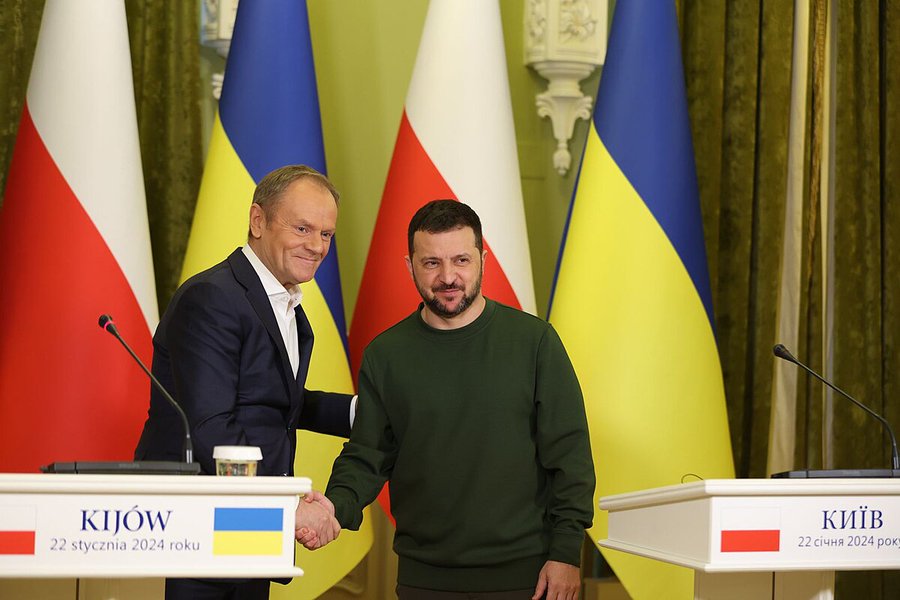Ian Proud was a member of His Britannic Majesty’s Diplomatic Service from 1999 to 2023. He served as the Economic Counsellor at the British Embassy in Moscow from July 2014 to February 2019. Prior to Moscow, he organized the 2013 G8 Summit in Lough Erne, Northern Ireland, working out of 10 Downing Street. He recently published his memoir, “A Misfit in Moscow: How British diplomacy in Russia failed, 2014-2019.”
Cross-posted Responsible Statecraft
Creative Commons Attribution 3.0 Poland
Of all the countries in Europe, Poland grapples with deep inconsistencies in its approach to both Russia and to Ukraine. As a result, the pro-Europe coalition government of Prime Minister Donald Tusk is coming under increasing pressure as the duplicity becomes more evident.
In its humanitarian response to Ukraine since the war began in 2022, Poland has undoubtedly been one of the most generous among European countries. Its citizens and NGOs threw open their doors to provide food and shelter to Ukrainian women and children fleeing for safety. By 2023, over 1.6 million Ukrainian refugees had applied for asylum or temporary protection in Poland, with around 1 million still present in Poland today.
That of course aligns with Poland’s consistently hawkish line and deep seated mistrust of Russia, dating back to the partition of Poland in 1939 following the Nazi-Soviet Molotov-Ribbentrop pact, the abuses of the Red Army in Poland in 1945 while driving the Nazis back to Berlin, and subjugation by a Soviet-installed puppet Communist regime after the war.
In a recent New York Times editorial, Poland’s Foreign Minister, Radoslaw Sikorski repeated the common Ukrainian mantra that the only way to negotiate with Russia is first to show force. With Russia still maintaining the military upper hand and also continuing life relatively as normal (there has been no need for a widespread mobilization of troops in Russia of the kind that is ongoing in Ukraine for men over the age of 25), it is unclear how ongoing supplies of military aid to Ukraine will do anything other than to prolong the war.
And for all of Sikorski’s comedy Eton-accented tough talk, it’s abundantly clear that Poland has no plans to show its force, having consistently expressed that it will not send troops to fight in Ukraine or participate in any so-called “reassurance force.” This may in part be linked to an uncomfortable truth: Poland also has a fraught relationship with Ukraine.
The Ukrainian government is often criticized for creating space for neo-Nazi sympathizing groups. That historical grievance remains an open wound in Poland to this day, on account of the Volyn massacre of July 1943, in which up to 100,000 Poles were stabbed, axed, beaten or burned to death by the Ukrainian Independence Army (UIA), which many far right figures in Ukraine continue to revere.
This year, Poland named July 11 the National Day of Remembrance for Volyn Massacre victims. Polish President Karol Nawrocki has also proposed a law that would outlaw “Banderite” symbols, such as the Black and Red UIA flag, which you will commonly see today flown above the graves of fallen Ukrainian service personnel.
As with resentment towards Russia, resentment towards Ukraine is common among ordinary Poles, linked both to the past and the present. In a recent poll, support in Poland for Ukrainian membership of the EU (and of NATO) was low, at 35%, with 42% opposed. An end to the war in Ukraine will certainly accelerate the issue of Ukrainian membership of the European Union, which will be disadvantageous to ordinary Poles.
As I pointed out a year ago for Responsible Statecraft, Poland is by far the largest recipient of European Union subsidies. In the EU’s multi-year financial framework covering its budget plans for 2028-2034, Poland is again set to be the largest beneficiary of EU funds by far, with $144 billion (EURO 123.3 billion).
This funding will be threatened by Ukraine’s membership of the EU, if it joined on equal terms to existing Member States. That is because Ukraine would account for 25% of all agricultural land, soaking up generous subsidies that currently benefit Polish farmers. Ukraine would also be by far the poorest European country and, with its still large if depleted population, be eligible for the largest share of so-called cohesion funds, which go into improving outdated infrastructure.



“I expect Poland increasingly to turn nationalist as these inconsistencies become more glaring.”
In other words, the people (at least the eastern part) of the EU are adapting to reality, while the politicians remain lost in self-serving delusion.